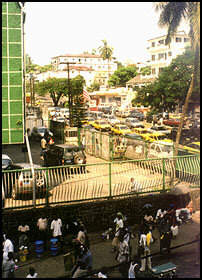 ELECTRICITY ELECTRICITY |
The Liberia Electricity Corporation (LEC) is public utility enterprise 100% owned by the Liberian government and established in the early 1970s by an Act of the National Legislature (Parliament) to be the sole producer and distributor of electrical energy throughout Liberia.

At the onset, the LEC developed the capacity to generate, transmit and distribute the required electricity within an effective radius of one hundred miles outside the capital, Monrovia. To serve the outlining areas that were far beyond the capital, a rural electrification scheme was instituted, and under which isolated grids were built in various populated areas where it was economically feasible to produce electricity.
The LEC power generation installations include a hydro plant with a capacity to produce 64megawatts installed in the 1960s; a thermal plant with gas turbines; heavy diesel marine-type engines and the recently installed small diesel plant of 9mva donated by the Taiwanese government.
The hydro plant, which supplied most of the capital's needs in the rainy season, suffered some damage due to neglect during the conflict years, but was determined as far back as the 1970s to expand to a much bigger facility. A United States-based company's study had found that the St. Paul River, where the main dam was built, had the capacity to produce power in excess of 600 to 700 megawatts. | The LEC management admits that a considerable portion of its installation was badly affected due to long-time neglect and age, but says the potential for a revitalized power generating entity is good.
The customer base of the LEC prior the civil conflict was about 40,000, generating an income of about 40million USD per annum, with a workforce of about 2,000 around the entire country. Its generating capacity was estimated at 173kw per 1,000 inhabitants
"It was a corporation that took care of itself. We were not directly subsidized by government, except in terms of capital investment, mainly because of how government investment policy was structured at the time," says Mr. Joseph Mayah, Managing Director of the LEC.
The LEC has had a history of investment interactions in critical areas like power generation, transmission and distribution with reputable institutions such as the World Bank, African Development Bank, European Investment Bank and the United States Agency for International Development (USAID) that started the country's hydro project.
Although much of the electricity generation and distribution facilities of the LEC has faded away, efforts by the government, and some foreign friends have led to the installation of five diesel units donated by Taiwan and upgrading the distribution network to which the European Union has contributed one million Euros.
Another step aimed at resuscitating the electricity sector was the conversion in December 1999 of the country's electricity supply system from the North American standard of 60 cycle (110/220 volts) to the IEC West African standard of 50 cycle (230/440 volts).
The conversion makes possible future connection to the West African grid, and lowers, over time, the unit cost of electricity since future inter connection will present the opportunity of buying or selling power abroad in the sub-region when the need arises.
"We are looking for partners with whom we can develop a scheme that is mutually beneficial to both parties. We have had problems, every nation goes through that, but we have no intention to bow our heads and let go. We have to move ahead, and we are seeking partners that can make us go right ahead," LEC Managing Director Mr. Mayah points out. |

